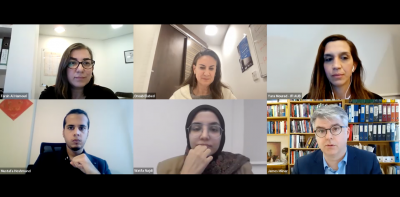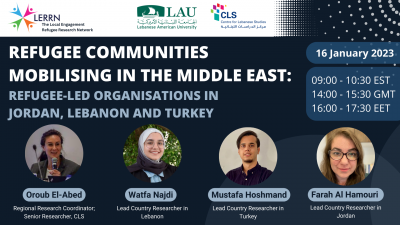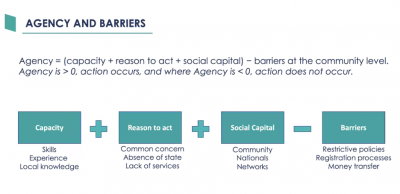Available in عربي Français Español
On January 16, the Local Engagement Refugee Research Network (LERRN), in collaboration with the Centre for Lebanese Studies (CLS), hosted a webinar to launch the Middle East results from the project Evaluation of Refugee-Led Organizations in East Africa and the Middle East. More than 100 participants from 25 countries joined the webinar to learn about refugee mobilisation and refugee-led organizations (RLOs) in Jordan, Lebanon, and Turkey. The webinar featured panelists Oroub El-Abed, Watfa Najdi, Mustafa Hoshmand, and Farah Al Hamouri from the research team, as well as discussants Meryem Aslan and Yara Mourad. Recent international commitments to localize aid, such as the 2018 Global Compact on Refugees, has placed an emphasis on enhancing refugees’ self-reliance and recognizing the value of refugee participation in decision-making. Coupled with the experience of the COVID-19 pandemic, these global dynamics have resulted in increased attention paid to the work of RLOs. The results of the Middle East research on refugee-led responses, summarized in the Executive Summary published ahead of the webinar, reveal conclusions that speak directly to these global trends and shed new light on the dynamics of refugee-led responses.

Oroub El-Abed kicked off the presentation by emphasizing that there is a long history of refugee-led responses in the Middle East. However, there have been very few studies that provide evidence of RLO impact. This study, similar to the study of RLOs in East Africa, demonstrates the positive impact of RLOs in Jordan, Lebanon, and Turkey. The results are a testament to the importance of enhancing refugee self-reliance and decision-making.
Watfa Najdi explained that RLOs in the Middle East vary significantly in terms of their organizational structures, agendas, and activities. Indeed, “one of the most particular advantages of RLOs is that they are able to identify the community needs in a very collaborative and inclusive way which results in the variations in the RLO activities in the region” Najdi explained. Farah Al Hamouri reflected on the obstacles to refugee agency in the region. The diverse policies of host states in Jordan, Lebanon, and Turkey grant different access to official registration for RLOs. Official registration is an important determinant of the capacity of RLOs, since registration enables access to international funding, ensures safety while operating, and establishes networks with other organizations. Mustafa Hoshmand emphasized that it is challenging to measure some of the most important impacts of RLOs, such as the social capital they build in refugee communities or their ability to bring awareness to refugee voices. RLOs may also play a role in building positive relationships with the host community and the state.
Reflecting on the report findings, El-Abed suggested a wide range of recommendations that could enhance the impact of RLOs in the region, help them better serve their communities, foster a trust-based relationship with RLOs, and better address the needs of refugees. These recommendations – addressing issues ranging from local to national to transnational levels – point out the need for more permissive laws that allow refugees to mobilise publicly and to register their organizations. The research team also recommended ensuring that a wider range of RLOs can access funding.
Yara Mourad from the Issam Fares Institute at the American University of Beirut (AUB) agreed with the factors that condition RLO responses, such as the policy environment of host countries and barriers surrounding the registration of RLOs. Mourad added that the dynamics of host communities are also a major factor in the activities of RLOs. Mourad suggested that future research could ask questions related to the relationship between refugee mobilisation and host communities: How can RLOs support refugees and host community members? What are best practices for outreach to the local community? How can RLOs contribute to community cohesion? Meryem Aslan from Oxfam Netherlands and the Refugee Council of Turkey further emphasized the importance of fostering trust and solidarity between international, national, and local partners working in the field of humanitarian aid. Aslan stated that while registration is crucial for RLOs to ensure a safe environment for their activities, registration does not guarantee funding, as pointed out by another recent report.
During the audience Q&A, the panelists drew attention to the importance of including localized knowledge and ensuring the safety of refugees when conducting research with refugee communities and with refugee research assistants. Ana Belén Anguita Arjona from UNHCR further underlined the importance of considering questions of representation and diversity in RLO mobilisation. How do different minority groups within refugee communities, such as people with different sexual orientations or people with disabilities, participate in RLOs and benefit from RLOs? It is also crucial that partnerships go beyond financial aid to building trust and solidarity. In conclusion, El-Abed emphasized that “refugees are active regardless of the barriers that affect them” and they exercise agency in different ways. Despite restrictive environments, refugee mobilisation continues. It is important to recognize the smaller, unregistered, and often “invisible” RLOs who do important work in their communities.
This report was prepared by Irem Karabağ, LERRN Project Writer.
Further Reading:
- Kaldor Centre blog on refugee leadership during the pandemic
- RSC’s research on refugee-led responses in East Africa
- Emergence of a norm of refugee participation at the global level
- IFI Refugee Research and Policy
Refugee Council of Turkey: “Funding to Local Actors” - Asylum Access’ Position Paper on equitable partnerships and the importance of addressing power and trust
- UNHCR’s work with RLOs

